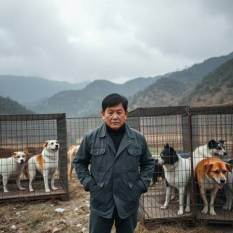SEOUL / South Korea, 28 June 2025: As South Korea prepares to enforce its dog meat ban by 2027, the law—once hailed by animal rights advocates—has left thousands of dog meat farmers in limbo and over 500,000 dogs facing uncertain futures.
Rev. Joo Yeong-bong, 60, a farmer in rural Korea, has raised dogs for decades. But now, with the government outlawing the industry, his business has become illegal—and unsellable.
“We’ve been trying to sell our dogs since last summer,” he told the BBC. “But not a single buyer has come forward.”
The government’s three-year grace period, meant to give farmers time to shut operations, is halfway through. But for many, there’s no path forward.
A Law Without a Plan
Chan-woo, a 33-year-old farmer with 600 dogs, echoes Joo’s fears: “Even if I wanted to shut down, there’s no infrastructure to process this many dogs. I’ve sunk everything into this farm, and now I face prison.”
Farmers are feeling abandoned. The government passed the ban in January 2024, but many say there was no plan for the aftermath—no clear process to relocate or rehome the dogs.
“They passed the law without any real plan,” Chan-woo said. “Now they tell us to surrender the dogs, but they won’t even take them.”
Lee Sangkyung, from Humane World for Animals Korea (Hwak), agrees: “The ban is in effect, but there’s been little discussion about what happens to the remaining animals.”
The Adoption Dilemma
Shelters are already overwhelmed. The dogs raised for meat—typically large breeds like the Tosa-Inu—are rarely sought after as pets in urban areas, where smaller breeds are preferred. Social stigma and fears of disease only worsen the situation.
“These dogs are seen as dangerous,” Lee explained. “There’s trauma, there’s size, and there’s a fear that they’re ‘damaged.’”
As a result, dogs that can’t find homes may be euthanized, despite government claims to the contrary.
“It’s heartbreaking,” said Cho Hee-kyung, head of the Korean Animal Welfare Association. “But if they’re considered abandoned, shelters will have no choice.”
The government says euthanasia “isn’t part of the plan”, offering farmers ₩600,000 ($450) per dog to shut down early. But Hwak argues the support is vague, insufficient, and underfunded.
Some NGOs are flying dogs abroad for adoption—but the numbers are small compared to the scale of the problem.
A Moral and Economic Quandary
Yang Jong-tae, 74, who shut down his farm in 2023, admits that seeing rescued dogs treated with love changed his perspective.
“We didn’t treat them like that—we just saw them as livestock.”
Still, he questions the moral consistency of the law.
“Why is it okay to eat cows, pigs, and chickens—but not dogs?”
Younger farmers feel trapped between a moral narrative and an economic collapse. “We’re not evil people,” says Chan-woo. “We just want to survive.”
Many are now calling for an extension of the grace period and concrete plans for rehoming or rehabilitation, warning of an impending crisis if current trends continue.
“People’s lives are unraveling,” said Joo. “If nothing changes by 2027, I believe something terrible will happen.”




















